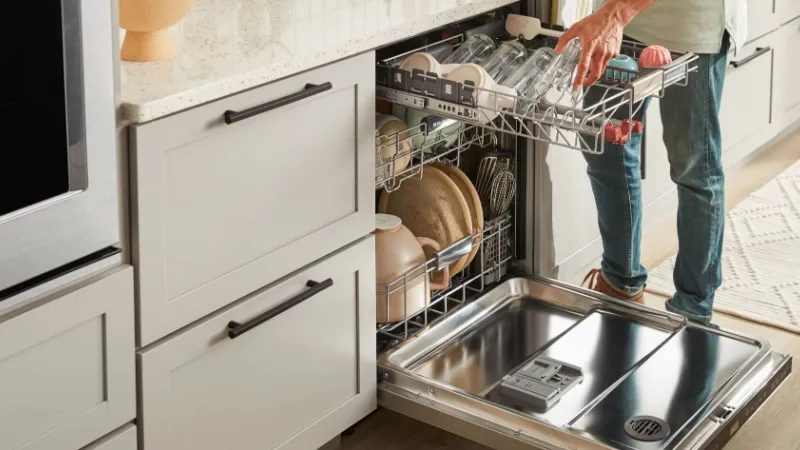To begin with, how long do KitchenAid dishwashers last? Below will tell you how to extend the lifespan of KitheAid dishwashers.
On average, most kitchen dishwashers last 10 years. However, they can last up to 12 years if properly cared for.
Please read on for more detailed information.
How Long Do KitchenAid Dishwashers Last?
On average, the KitchenAid dishwasher lasts ten years when you use it properly.
Nonetheless, it can surpass this age if you place it on routine maintenance and proper care. But going further, the KitchenAid dishwasher may start to drop in performance.
Generally, this dishwasher has a pretty impressive lifespan compared to several other averages andextended life dishwashers.
Of course, this does not insinuate that it is a superior brand; however, it gives your value for your bucks.
KitchenAid dishwashers are among the most reliable brands; they do not fail when you need them most.
On the other hand, its compact design and staunch nature allow long-lasting usage and top-notch functioning.
As far as it trails within its life expectancy years, you never have anything to worry about.
Users of the KitchenAid dishwasher have attested to its incredible strength and durability, making it one of the most long-lived in the market. Getting a KitchenAid isn’t a bad idea after all.
How long do dishwashers last? The guide will include various dishwasher lifespans. Use this guide to prolong the life of your dishwasher and keep it in good working condition.
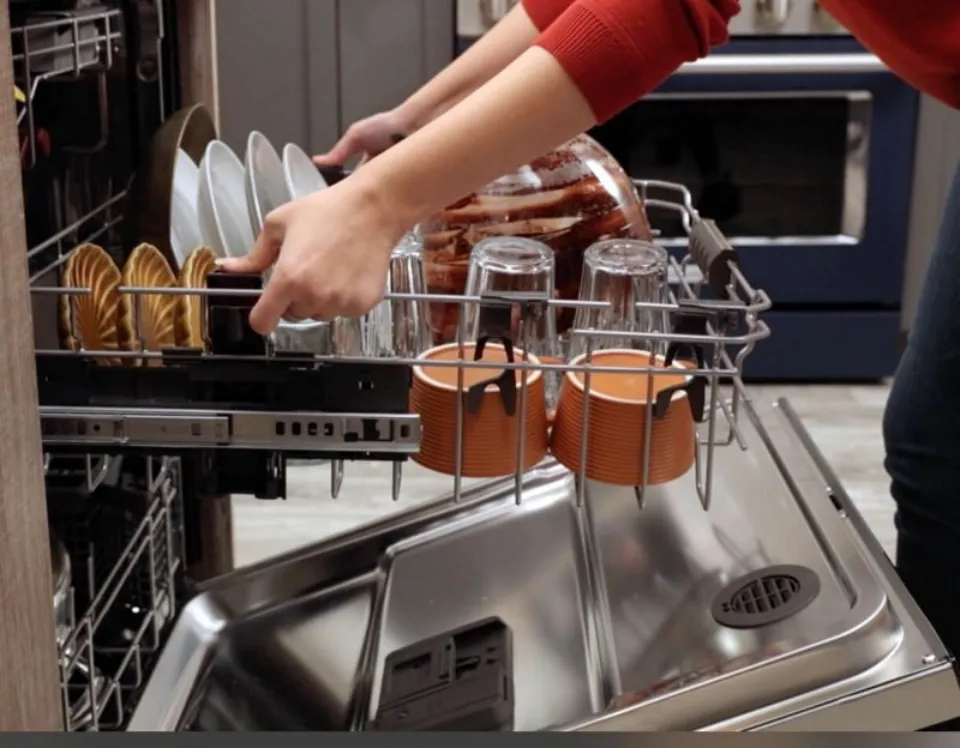
Extend the Life Expectancy of a Kitchenaid Dishwasher
Dishwashers are pricey but useful kitchen appliances that take the work out of doing the dishes every day.
Although they save time that can be used for other things, they also require upkeep and proper care to last longer.
A KitchenAid dishwasher can last longer with proper use. Here are some sensible ideas for extending its use.
Do Repairs and Maintenance on Time
As they get older, all electrical appliances are susceptible to developing problems. With age, power fluctuations and outages may also have an impact on your Kitchenaid dishwasher.
The issue is that, if ignored, a seemingly minor problem could quickly spiral out of control. So, for dishwasher maintenance and care, abide by the manufacturer’s instructions.
Ensure that it is installed in accordance with the manufacturer’s instructions and is utilized as intended.
Your appliance will run more efficiently for a lot longer if you call a professional right away to fix any technical problems that arise.
If there are any issues, such as longer running cycles, standing water, or improper dishwashing, they must be addressed immediately.
Additionally, to keep the appliance in top shape, perform the recommended routine maintenance and cleaning.
Clear the Dishes before Loading Them in the Dishwasher
Even the most difficult and soiled stains and soil on dish surfaces are no match for your Kitchenaid dishwasher.
Dishes will last longer if you remove any stuck-on food and stubborn stains, though.
Before putting the dishes in the dishwasher, clean the plates and bowls of food residue. This will spare your Kitchenaid the trouble of removing these clogged food particles.
It will also help your filter remain clean for longer without food clogging up the pipes and vents.
Dishes don’t need to be pre-rinsed before being placed in the dishwasher. But by doing so, the dishwasher won’t have to work as hard.
How long do dishwasher pods last? In this post, we’ll discuss the warning signs you should watch out for if you suspect that the pods you bought may have expired.
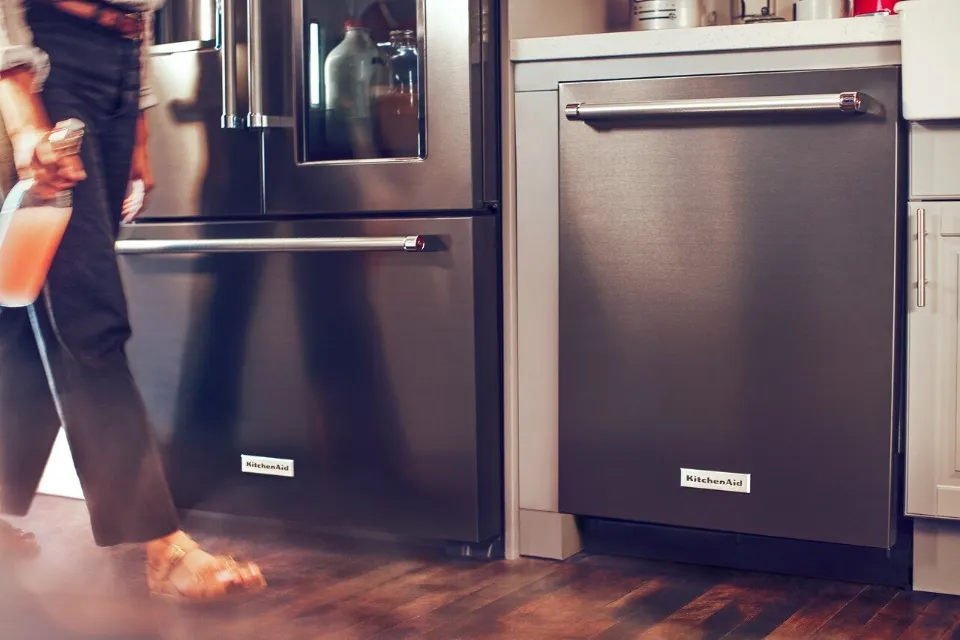
Regularly Inspect and Clean the Spinning Hoses
One key element of the dishwasher is its spinning arms. Water is sprayed on all surfaces by these movable arms.
The necessity of their proper operation and the absence of any obstacles follows. Check the spray arms frequently to make sure the dishwasher is running smoothly.
If there is any accumulation, remove it right away. By doing this, you can make sure the dishwasher runs as efficiently as possible without limiting the water flow.
To get rid of dirt that prevents water from flowing, use a small cleaning tool like a wire cleaner.
But when cleaning the holes, be gentle. Avoid pushing them as this will change the flow rate and have an impact on how well the device works in general.
Keep the Appliance Clean
Your Kitchenaid dishwasher will look good if the outside is cleaned frequently.
However, it will also stop rust from forming on the metal surface.
Significant damage can be done by rust, which can also shorten the device’s lifespan and detract from its aesthetic appeal.
The insulation layer inside the door needs to be cleaned similarly. Dust and dirt will accumulate here easily.
The door won’t seal properly if it becomes overly dirty. The dishwasher might break down as a result.
Maintain regular insulation layer cleanings to prevent this issue.
Dust or food crumbs can be gently removed with a damp cloth, and the area can then be dried with a dry cloth.
For consistent top-notch maintenance of your dishwasher, you should also clean the detergent tray, the baskets, and the interior of the door.

Remove Any Limescale Deposits
Minerals will accumulate more quickly in the water system of your dishwasher if you live in an area with hard water.
The operational effectiveness and durability of your device will be affected by this.
The good news is that you can deal with it in advance to stop it from becoming a problem.
To keep any hard water minerals from entering the system at all, it is best to use a water softener at the inlet.
However, this can be costly and requires modifications to the plumbing.
Descaling tablets can be used in that situation to get rid of any buildup inside your dishwasher.
Additionally, you can occasionally remove any limescale buildup inside the compartments by running white vinegar through the detergent system.
Let the Dishwasher Dry Completely Between Cycles
Dishwashers are designed to frequently come into contact with water.
But if they are left damp for too long, they can develop mold and mildew.
In the winter or if you keep your dishwasher in a humid environment, mold and mildew are more likely to develop.
Mold and mildew are challenging to get rid of once they develop inside the dishwasher.
Additionally, it will emit offensive odors and cause the dishwasher to smell.
Installing the dishwasher in an area with good airflow will help you avoid this problem.
This will facilitate complete device drying.
Additionally, after a cycle, leave the door slightly ajar to permit full water evaporation.
Additionally, you can wipe the interior surfaces after each cycle to remove extra moisture.
In order to get rid of any mold or mildew and stop it from coming back, experts also advise running the dishwasher with bleach for one cycle.
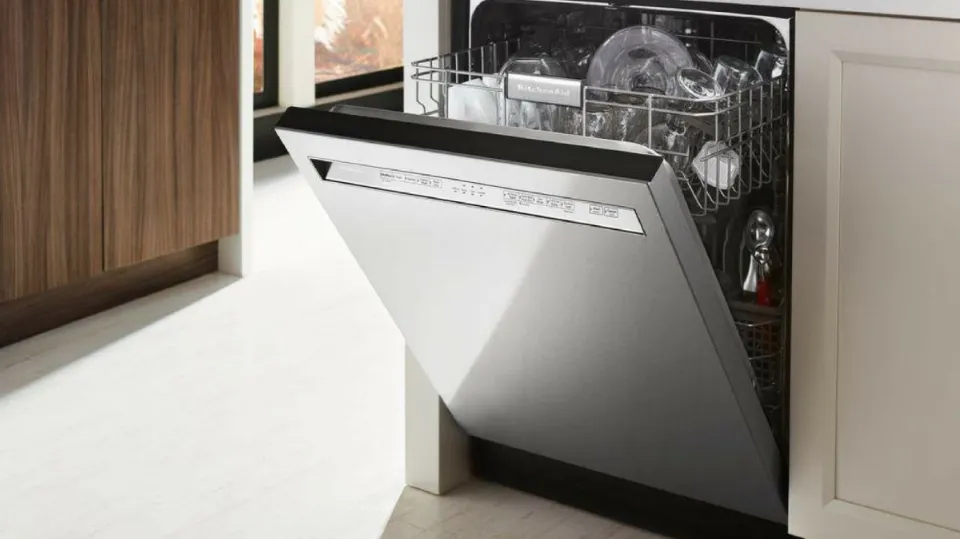
Pros: Reasons To Buy a KitchenAid Dishwasher
There are plenty of reasons to consider a KitchenAid dishwasher. Maybe you just bought a KitchenAid refrigerator and range and want your appliances to match. (KitchenAid does offer nice discounts when you buy a full appliance package.) Or maybe your dishwasher just broke down and you’re a fan of the brand.
- They’re quiet. As we mentioned, they were pretty noisy in the past, but you now you can get a KitchenAid dishwasher that’s a whisper-quiet 39 decibels (dB), and the rest are a respectably quiet 44 dB. As a rule of thumb, we recommend choosing a dishwasher that’s under 50, especially if your kitchen has an open layout.
- They all have condensation drying. You can’t make a mistake and accidentally choose one that has a less-efficient, plastic-melting heated dry instead. All KitchenAid dishwashers now have European-style condensation drying, which means they also have a nice-looking and durable stainless steel tub. Some models supplement the condensation drying with a fan assist option—it’s helpful for evaporating the puddles left on top of some cups and containers.
- You have exterior options.KitchenAid is one of the more affordable brands that offers panel-ready built-in refrigerators. It also makes panel-ready dishwashers, so both appliances can blend in with your cabinetry. If you want a more professional look, you can opt for smudgeproof stainless steel, which KitchenAid calls its PrintShield finish.
- They can fit more than any other home dishwasher. Most dishwashers hold 15 place settings. A KitchenAid dishwasher can hold 16. This has long been one of the company’s selling points, and it’s still valid. They’ve really got the capcity. That’s partly due to the **FreeFlex third rack** that KitchenAid introduced recently. It’s tall enough to fit a full pint glass. They designed it to compete with Bosch’s MyWay rack, and it really is better. The angled levels really do let you fit more up there. The only drawback? You can’t fit as much on the rack underneath.
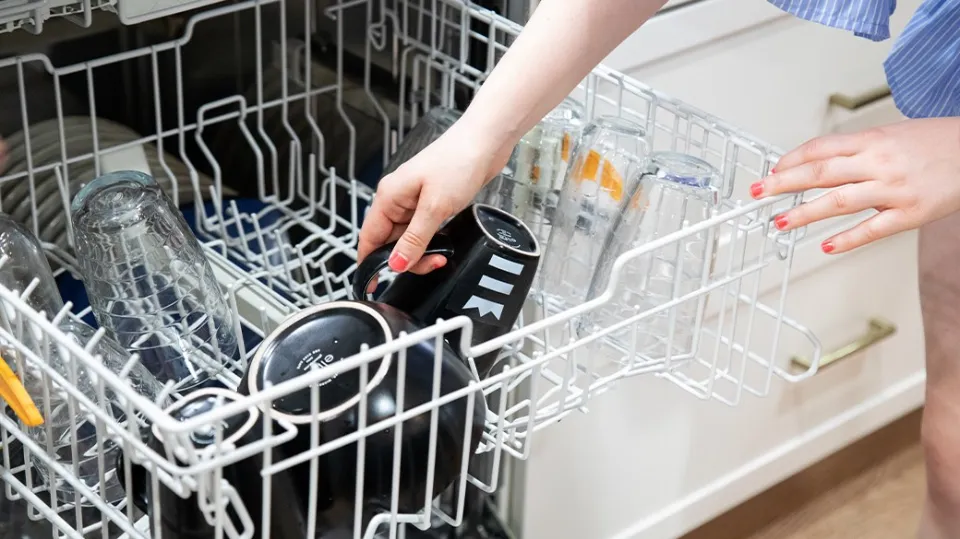
Cons: Reasons To Avoid a KitchenAid Dishwasher
Unless you’ve got your heart set on KitchenAid, we have to say other brands give you more value for your money. Also, no single dishwasher is perfect for everybody. We want you to have all the information upfront so you can pick out the right one for you.
- You can get more for your money. Brands such as Bosch and Miele dishwashers offer more fully featured dishwashers for similar prices—or in some cases, less. You can get truly convenient features, like an auto-open door to enhance drying, that KitchenAid doesn’t offer.
The upgrades KitchenAid does offer as you go up in price aren’t all worth it. It’s quietest dishwashers are the most affordable. As you go up in price, you do get some valuable features like more advanced drying and filtration systems. But the other upgrades to the racks, like a utensil basket or extra stemware holders, aren’t very substantial. - No WiFi.At this time the company does not offer wifi.
- KitchenAid dishwashers stick out of cabinets. They have an unusual depth of either 24 1/2 or 24 ¾-inches deep, which means they all stick out of a standard 24-inch-deep kitchen cabinet. They can’t fit into a standard opening without protruding.
If you’re redoing your kitchen cabinets, you can factor this in to get a seamless finish, but it’s still tricky. For instance, you might consider putting your dishwasher and sink on the kitchen island and putting the cooktop under the window.
But if you’re replacing an older dishwasher from another company, it might be more trouble than it’s worth. That’s especially true if you want a panel ready dishwasher to blend into your kitchen cabinets. - Limited variety.KitchenAid basically makes only four different dishwasher styles. At the bottom, there’s one with visible controls. Then you step up to a towel bar handle, a pocket handle, and a custom handle. Add in color and door options, and you have about 20 dishwashers to choose from. The selection is especially limited right now due to the pandemic. KitchenAid dishwashers in black and white are impossible to find.
FAQs
Do KitchenAid Dishwashers have Wi-Fi?
No, KitchenAid dishwashers don’t have Wi-Fi connectivity. Only KitchenAid cooktops and ovens are Wi-Fi enabled.
Does KitchenAid still make glass door dishwashers?
No, KitchenAid discontinued its glass door dishwashers. The see-through door certainly was a conversation starter, but users found no real-life benefit associated with the design.
Do KitchenAid Dishwashers Dry Well?
Another area where KitchenAid excels is drying performance. While it doesn’t beat Bosch dishwashers, it towers over many other popular brands thanks to its extra fan-enabled ProDry system.
The ProDry system uses a recessed heating element to draw moisture off plastic dishes. This means faster drying and better sanitation. Use the extended ProDry, and you can run the heating element for longer. However, you might prefer to use the condenser drying option for ceramic and metal dishware.
Are KitchenAid Dishwashers Reliable?
When it comes to reliability, we have to lean toward other popular brands. While KitchenAid has been improving steadily and garnering more positive reviews, it hasn’t always scored as high as its competitors. That being said, KitchenAid dishwashers are still more reliable than the average dishwasher brand on the market.
Summary: How Long Do Kitchenaid Dishwashers Last?
If you use it correctly, the KitchenAid dishwasher can be used for an average of ten years. KitchenAid produces high-quality dishwashers that can accommodate more dishwashers than any other product on the market. The company has also really improved their cleaning and drying performance and noise level recently.
We still prefer other brands with better cost performance, but if you are a fan of KitchenAid and want everything to match, please rest assured that these dishwashing opportunities meet your expectations. Compared with other popular brands, their reliability is slightly poor, but their high-quality features make them worth the money.
If you have any questions, please leave a comment. My Prime Home tries to give you the best home improvement information. Don’t forget to share the post. Thank you for reading.
You may want to know:
- How Long Do Bosch Dishwashers Last?
- How Long Do GE Dishwashers Last?
- How Long Does A Whirlpool Dishwasher Last?
- How Long Does A Frigidaire Dishwasher Last?
- How Long Do Asko Dishwashers Last?
- How Long Do Kenmore Dishwashers Last?
- How Long Do Maytag Dishwashers Last?
- How Long Do Miele Dishwashers Last?
